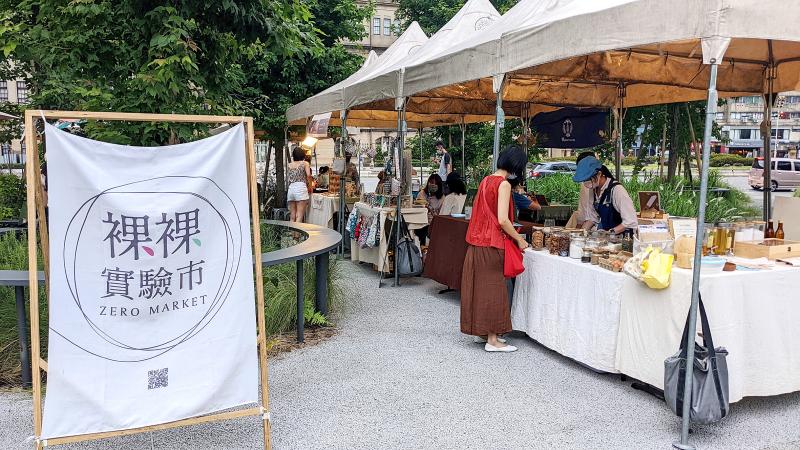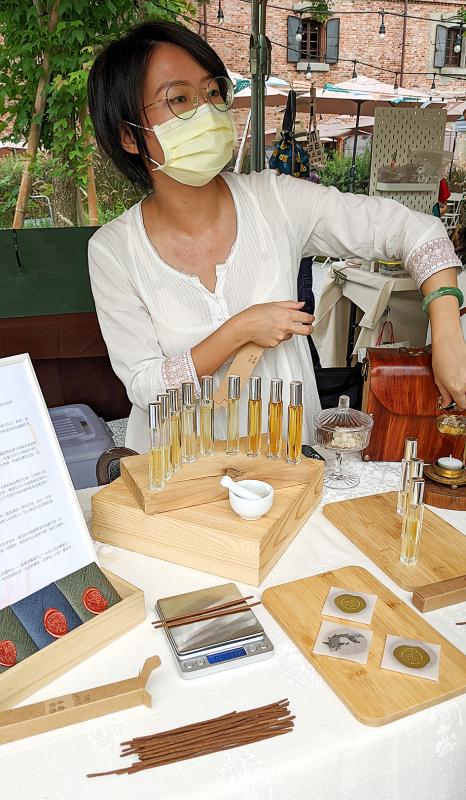Packageless stores may seem like a recent trend in Taiwan, but they’ve actually been around for decades — though in a different form. The staff at San Shi Living Lab (三時生活實驗室) say that the shop is popular with the older folks due to their familiarity with traditional markets, while the younger customers at the vegan Zero Living (零生活) have fond recollections of the Green Bean (小豆苗) bulk snack shops that were all the rage in the 1990s.
“Then, the supermarkets took over,” Zero Living owner Boris Su (蘇冠宇) says. “And these shops declined.”
But concerns over the huge impact packaging has on the environment, zero-waste stores — where people bring their own containers and purchase exactly what they need by weight — have been popping up across Taiwan. It’s still a niche business, mostly catering to the eco-conscious, but awareness is growing, especially with the government’s ongoing efforts to reduce single use plastics and other efforts such as rentable reusable cups.

Photo: Han Cheung, staff reporter
SAN SHI LIVING LAB
I meet San Shi Living Lab’s manager Kuo Tzu-chia (郭子嘉) at their monthly Naked Market (裸市集) at the Taipei Info Hub, where about a dozen vendors are peddling their wares. Kuo says that it’s hard to mandate that all the stalls go completely package free, but their goods have to be environmentally friendly and refrain from plastic packaging. There’s also a clothing and book swap.
“It took a while to attract visitors, but we see people bringing their own containers now,” Kuo says. “The vendors don’t all work in the same way, and they’re trying different things to reduce waste. But at least we’re all moving in the same direction.”

Photo: Han Cheung, staff reporter
For example, a handmade perfume and incense stall encourages people to return and reuse the bottles, while customers can buy incense by the stick according to weight.
The market was launched about three years ago by creative studio Vision Union (景澤創意), but COVID-19 has slowed its development and reach. Kuo says the studio owner, who had wanted to do something for the environment, started this store after participating in ocean waste workshops.
“We need to ... start changing our daily habits,” Kuo says.

Photo: Han Cheung, staff reporter
The actual San Shi Living Lab is tucked inside an alley in Taipei’s Zhongshan District (中山). From chemical-free cleaning products and biodegradable toothbrushes to local teas, beans, flour, coffee and rice, it’s an impressive array. Some are specialty items that aren’t found in regular stores, such as prickly ash powder and “ugly vegetable” cookies, which seem to be quite popular. One customer cleared out the entire box when I visited. The store also has used containers on hand for those who forgot to bring theirs.
A cloth tote bag caught my eye: “I pledge to use this bag 131 times.” Only then will it offset the costs and labor involved in making it.
ZERO LIVING

Photo: Han Cheung, staff reporter
Su, owner of Zero Living, also became interested in reducing waste due to the amount of plastic waste in the ocean. He spent time working and diving in Australia, and in addition to appreciating the less frenetic life there, also noticed similar package-free stores. There were few such places in Taiwan when he started about two years ago — much less vegan ones.
Because it’s still a niche market, so ZeroLiving also has an attractive brunch and coffee menu using locally-sourced and eco-friendly ingredients.
“You don’t have to just sell stuff, food is another way to protect the environment,” he says.

Photo: Han Cheung, staff reporter
He invites other like-minded businesses to open pop-up stores, and also do outreach in schools.
Su says he often has difficulty sourcing products from suppliers because they are concerned unpackaged food perishes more quickly. The store often has to buy in bulk, making it harder to change items. The prices vary compared to regular stores, he adds, with some distributors offering discounts or fair prices. The store tries to balance the costs so people aren’t generally paying more to do the right thing. But many of the quality, eco and vegan-friendly products are more expensive to begin with.
There’s still a way to go with these stores, Su says, and the key is to diversify and keep coming up with different ways to push the idea and attract customers.

Aug. 4 to Aug. 10 When Coca-Cola finally pushed its way into Taiwan’s market in 1968, it allegedly vowed to wipe out its major domestic rival Hey Song within five years. But Hey Song, which began as a manual operation in a family cow shed in 1925, had proven its resilience, surviving numerous setbacks — including the loss of autonomy and nearly all its assets due to the Japanese colonial government’s wartime economic policy. By the 1960s, Hey Song had risen to the top of Taiwan’s beverage industry. This success was driven not only by president Chang Wen-chi’s

Last week, on the heels of the recall election that turned out so badly for Taiwan, came the news that US President Donald Trump had blocked the transit of President William Lai (賴清德) through the US on his way to Latin America. A few days later the international media reported that in June a scheduled visit by Minister of National Defense Wellington Koo (顧立雄) for high level meetings was canceled by the US after China’s President Xi Jinping (習近平) asked Trump to curb US engagement with Taiwan during a June phone call. The cancellation of Lai’s transit was a gaudy

From Godzilla’s fiery atomic breath to post-apocalyptic anime and harrowing depictions of radiation sickness, the influence of the nuclear bombings of Hiroshima and Nagasaki runs deep in Japanese popular culture. In the 80 years since the World War II attacks, stories of destruction and mutation have been fused with fears around natural disasters and, more recently, the Fukushima crisis. Classic manga and anime series Astro Boy is called “Mighty Atom” in Japanese, while city-leveling explosions loom large in other titles such as Akira, Neon Genesis Evangelion and Attack on Titan. “Living through tremendous pain” and overcoming trauma is a recurrent theme in Japan’s

As last month dawned, the Democratic Progressive Party (DPP) was in a good position. The recall campaigns had strong momentum, polling showed many Chinese Nationalist Party (KMT) lawmakers at risk of recall and even the KMT was bracing for losing seats while facing a tsunami of voter fraud investigations. Polling pointed to some of the recalls being a lock for victory. Though in most districts the majority was against recalling their lawmaker, among voters “definitely” planning to vote, there were double-digit margins in favor of recall in at least five districts, with three districts near or above 20 percent in